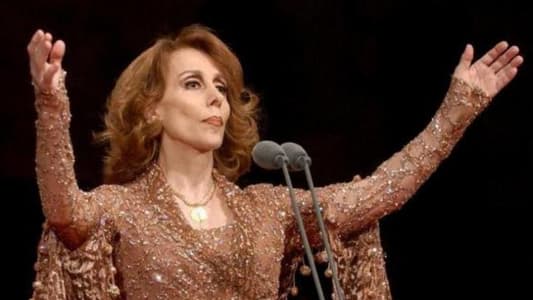One year after their wedding, in 1955, Fairuz and her husband Assi Al-Rahbani traveled to Egypt for the first time. Cairo, which was then the center of the Arab theater, cinema, and song, was conquered by the young Lebanese singer. Fairuz's triumph in Egypt led to many offers by celebrated Egyptian composers and filmmakers, but by then she was expecting her first child. She returned to Lebanon and gave birth to her son Ziad on January 1, 1957. She was later to have four more children, three girls and one boy. But it was Ziad who remained closest to her of all her children and who in later years wrote and composed the music for many of her songs.
In the summer of 1957 Fairuz appeared for the first time before a live audience. Until then she had been restricted to the recording studios. She sang in a musical review ("Ayam el Hissad," or "Harvest Days") before a large spellbound audience seated in the Roman ruins of the Temple of Jupiter in Baalbeck. This was her first appearance at the Baalbeck International Festival, and she was awarded the highest medal for artistic achievement there, the Cavalier, by the then-president of Lebanon, Camille Chamoun. Fourteen years later a stamp was issued by the government to commemorate her name.
Fairuz became one of the main attractions at the annual International Festival of Baalbeck, where she sang in musical plays or massrahiyaat that were written especially for her by the Rahbanis. In 1975 the 15-year civil was in Lebanon began, putting an end to the Baalbeck Festival, and some time later Fairuz's separation from her husband Assi ended her artistic collaboration with the Rahbani brothers.
With a reputation that had grown to include all the Arab world and the expatriate communities in Europe and the Americas, poets and composers everywhere rushed to write for Fairuz. The result was a repertoire of more than 800 songs, three feature films, and 400 LP recordings during a period of three decades. She was invited to appear in the major Arab capitals. She gave concerts in New York, San Francisco, Montreal, London, and Paris. She was awarded the Medal of Honor in 1963 and the Gold Medal in 1975 by King Hussein of Jordan. Fairuz had become a legend in her own time.
Her repertoire as a whole, both in text and music, was marked by innovation. It testified to her own broad musical background. She sang of love and the simple life, of love of country, and of the longing for a lost Jerusalem; she sang old bedouin chants and obscure shepherd's songs; she brought back the muashahat, a musical form first heard in the gardens of Andalusia; she interpreted the quasida and the nashid, two highly structured lyrical verse forms and, with equal success, the improvisational vocal expressions known as the mawal and meyjana. It was this special combination of lyrics, music, and vocal quality that earned Fairuz the name of "ambassador to the stars." Fairuz became a major influence on contemporary Arab music and culture.
In March 1994, at the age of 60, Fairuz performed a concert at the Olympia in London, drawing over 6000 fans. Western critics compare her to Billie Holiday and call her the "Callas of Arabia."






TWEET YOUR COMMENT